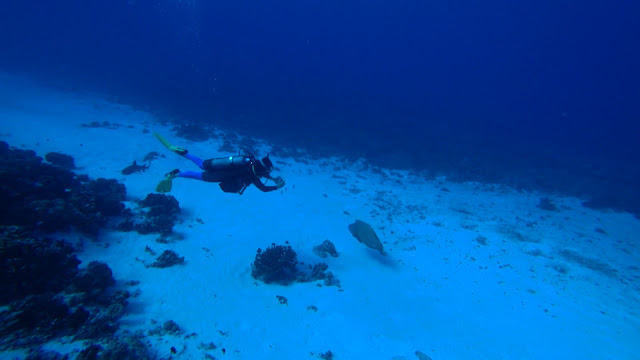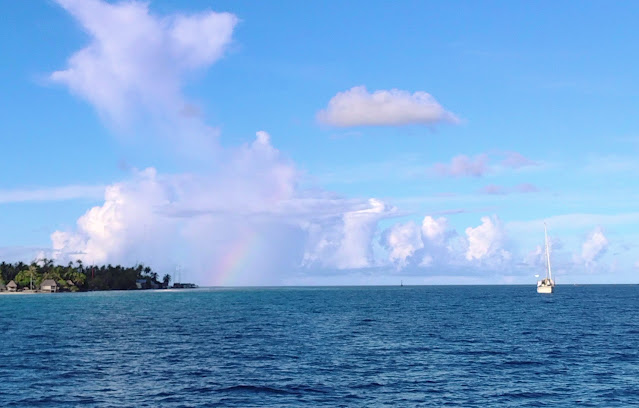Sharks are fearsome, sharp-toothed predators that can smell blood from miles away, and they have been known to attack and kill humans with their powerful jaws and razor-sharp teeth. This is the picture that many people have of sharks and the thought of diving with them can be rather daunting.
In reality it's true that sharks are powerful predators, however, they are not mindless killing machines. Most shark species are actually quite docile and have no interest in attacking humans.
Welcome to diving the South Pass of Fakarava, where the water is crystal clear, and the sharks are numerous. As avid divers, this is an experience we didn't want to miss. We had been hearing from fellow cruisers about how amazing and numerous the sharks are here and we were very happy to get to see it ourselves.
 |
| Black tipped reef sharks, dappled by the sunlight, how many can you find? |
We never felt in danger from the sharks, perhaps a bit of adrenaline rush as one or more of them are heading directly towards us, but they are just curious and always veer away as they get close.
Some closer views of the sharks and a gratuitous photo bomb by a surgeon fish.
The dive itself is a drift dive through the pass, which means that we needed to take the tidal current into consideration when timing our dives. It was tricky trying to get the timing just right. Diving the South Pass of Fakarava is tide and current dependent. You have to dive on the incoming tide, ideally at the end of the tide, so the current is not sweeping you out to sea, nor is it so fast that you don't have time to enjoy the fish watching. The best time to dive is shortly before the lowest tide, moving into slack tide when the current is manageable. It was amazing to watch the tide turning when underwater. A curtain of cloudiness starts to approach and you know it is time to turn and go with the changing current rather than trying to fight it.
Occasionally we saw remoras attached to sharks. They eat the parasites on the shark's skin and hope for any scraps flying by from whatever the shark is eating. We have heard they can latch onto divers, but this one was just swimming along with our friend Andrew from SV Waveriders.
In addition to the sharks, the other marine life in the South Pass of Fakarava is also breathtaking.
 |
| Sarah with a Humphead Wrasse (picture courtesy of Lianne on SV Waveriders) |
We saw several very large Humphead Wrasses, up to 5 feet long, although there have been reports of Humpheads as big as 7 feet.
The older they get the more pronounced their brow gets and the bluer their face gets.
It is very satisfying watching these large creatures swim by.
We saw many other types of fish, all of them seemingly oblivious to the sharks swimming around them. Apparently many of these sharks are here in this pass because it is a good place for them to sleep. Sharks can sleep on one half of their brains while the other half is alert. I have been trying to work on this skill myself with very little success.
We finished up our time in the south of Fakarava with this rainbow illuminating the pass and reflecting the incredible experience of diving with the sharks.
Enjoyed this post? Never miss out on future posts by following us





We love to hear your comments.
This is a test comment. I hope I have fixed the glitch,
Post a Comment